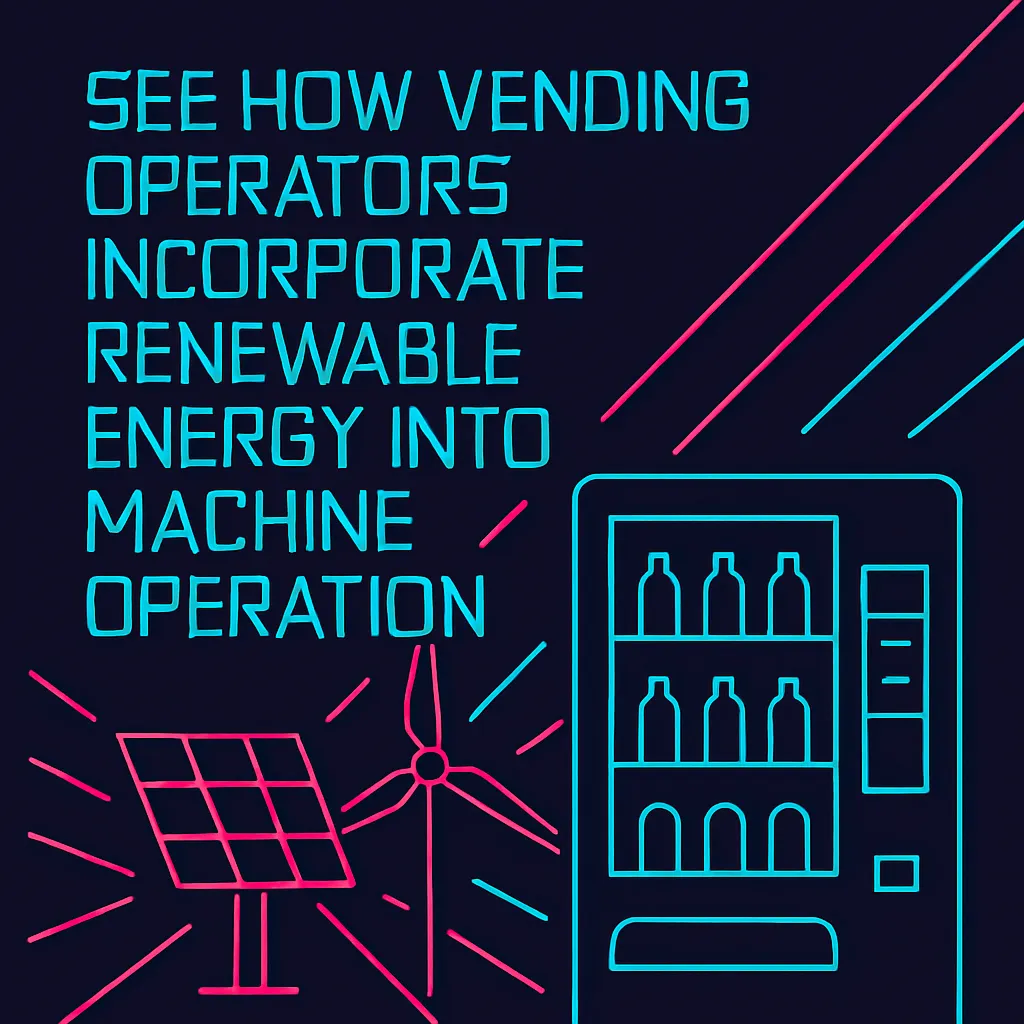Renewable Energy Use in Vending Machines
See how vending operators incorporate renewable energy into machine operation.
Back to Eco Friendly Vending ResourcesSee how vending operators incorporate renewable energy into machine operation.
Back to Eco Friendly Vending ResourcesIntegrating renewable energy sources like solar power into vending machine operations reduces environmental impact and lowers electricity costs. As technology advances, more machines are designed to run efficiently on clean energy.
![]() Reduce carbon footprint with sustainable power sources
Reduce carbon footprint with sustainable power sources
![]() Lower operating electrical costs long-term
Lower operating electrical costs long-term
![]() Attract eco-conscious businesses and consumers
Attract eco-conscious businesses and consumers

The vending industry is constantly evolving, with a growing focus on sustainability and energy efficiency. Renewable energy, particularly solar power, is becoming a viable and attractive option for powering vending machines. This shift not only aligns with global environmental goals but also offers practical benefits for businesses and consumers alike. By harnessing clean energy, vending operations can significantly reduce their reliance on traditional electricity grids, leading to substantial cost savings and a smaller carbon footprint.
Solar power is at the forefront of renewable energy integration in vending. Modern solar panels can efficiently capture sunlight and convert it into electricity, which is then stored in advanced battery systems. This stored energy powers the machine, ensuring continuous operation even during periods of low sunlight or at night. Such systems are especially beneficial for outdoor placements or in remote locations where conventional power sources might be costly or difficult to access. This leads to reduced operational costs over the machine’s lifespan and supports a greener brand image. For facilities committed to sustainability, exploring green vending options in the public sector can lead to significant environmental benefits.
Adopting renewable energy in vending machines goes beyond financial incentives. It demonstrates a commitment to environmental stewardship, which resonates deeply with today's eco-conscious consumers. Businesses that implement green vending solutions can enhance their brand reputation, attract new customers, and meet corporate social responsibility objectives. This approach supports initiatives like those discussed in eco-friendly vending in entertainment venues, fostering a positive perception for customers. Moreover, newer machines often come with advanced features that contribute to their efficiency. Knowing what connectivity options are essential can help in decision-making, which is why understanding whether vending machines need WiFi or power is crucial for planning.
The future of renewable energy in vending machines involves smart technology and innovative design. Integration with energy management systems allows for real-time monitoring of energy consumption and generation, optimizing performance and efficiency. As battery technology improves and panel efficiency increases, green vending solutions will become even more widespread and cost-effective. These advancements pave the way for a more sustainable and economically sound vending industry, offering a win-win for both businesses and the planet.
It involves powering vending machines with sources like solar, wind, or geothermal energy to reduce their environmental impact.
It helps reduce carbon footprints, lowers operational costs, and appeals to environmentally conscious consumers and businesses.
Solar power, especially for stand-alone or outdoor machines, is the most common due to its portability and passive energy generation.
While many newer models are designed for energy efficiency, older machines may require modifications or be less suitable for full renewable integration.
Solar panels convert sunlight into electricity, which is stored in batteries to power the machine, often supplemented by grid power when necessary.
Reduced electricity bills, environmental sustainability, and the ability to operate in remote locations without direct grid access.
Often, tax credits, grants, or rebates are available for businesses adopting renewable energy technologies, including in vending. Check local regulations.
Generally, they might require periodic checks of solar panels or battery systems, but many are designed for low maintenance to ensure reliability.
Reduced operational costs from energy savings can potentially lead to more competitive pricing or offset initial investment costs without affecting product prices.
They are particularly effective in outdoor venues, parks, remote job sites, or any location where grid power access is limited or expensive.